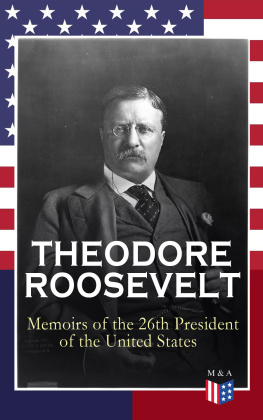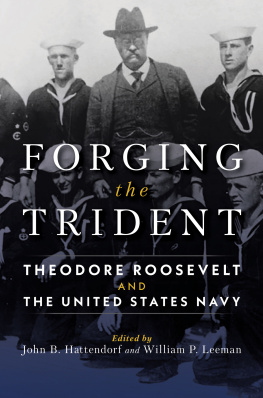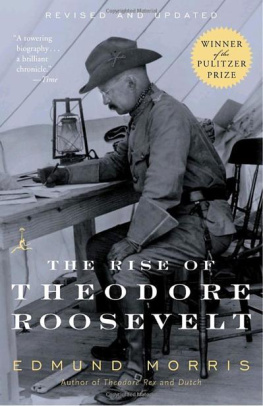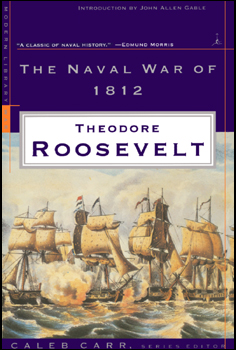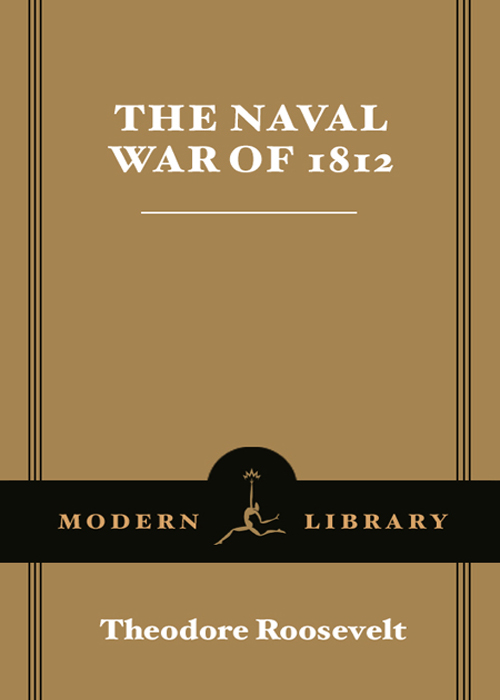
CONTENTS
T HE N AVAL
W AR OF
1812
THEODORE ROOSEVELT
T HE N AVAL
W AR OF
1812
Series Introduction by Caleb Carr
Introduction by John Allen Gable

T H E M O D E R N L I B R A R Y
N E W Y O R K
1999 Modern Library Edition
Biographical note copyright 1996 by Random House, Inc. Series Introduction copyright 1999 by Caleb Carr Introduction copyright 1999 by John Allen Gable
All rights reserved under International and Pan-American Copyright Conventions. Published in the United States by Random House, Inc., New York, and simultaneously in Canada by Random House of Canada Limited, Toronto.
Modern Library and colophon are registered trademarks of Random House, Inc.
LIBRARY OF CONGRESS CATALOGING-IN-PUBLICATION DATA
Roosevelt, Theodore, 1858-1919.
[Naval War of 1812, or, The history of the United States Navy during the last war with Great Britain]
The naval War of 1812/Theodore Roosevelt.
p. cm.
Previously published: The naval War of 1812, or, The history of the United States Navy during the last war with Great Britain.
Annapolis, Md.: Naval Institute Press, c1987.
1. United StatesHistoryWar of 1812Naval operations.
2. United States. NavyHistoryWar of 1812. 3. New Orleans
(La.), Battle of, 1815. I. Title.
E360.R86 1999
973.5'25dc21 98-48973
Modern Library website address: www.modernlibrary.com
eISBN: 978-0-679-64185-8
v3.0
X
1815
T HE B ATTLE OF N EW O RLEANS
The war on land generally disastrous British send great expedition against New Orleans Jackson prepares for the defence of the city Night attack on the British advance guard Artillery duels Great battle of January 8, 1815 Slaughtering repulse of the main attack Rout of the Americans on the right bank of the river Final retreat of the British Observations on the character of the troops and commanders engaged
While our navy had been successful, the war on land had been for us full of humiliation. The United States then formed but a loosely knit confederacy, the sparse population scattered over a great expanse of land. Ever since the Federalist party had gone out of power in 1800, the nations ability to maintain order at home and enforce respect abroad had steadily dwindled; and the twelve years nerveless reign of the Doctrinaire Democracy had left us impotent for attack and almost as feeble for defence. Jefferson, though a man whose views and theories had a profound influence upon our national life, was perhaps the most incapable Executive that ever filled the presidential chair; being almost purely a visionary, he was utterly unable to grapple with the slightest actual danger, and, not even excepting his successor, Madison, it would be difficult to imagine a man less fit to guide the state with honor and safety through the stormy times that marked the opening of the present century. Without the prudence to avoid war or the forethought to prepare for it, the Administration drifted helplessly into a conflict in which only the navy prepared by the Federalists twelve years before, and weakened rather than strengthened during the intervening time, saved us from complete and shameful defeat. True to its theories, the House of Virginia made no preparations, and thought the war could be fought by the nation in arms; the exponents of this particular idea, the militiamen, a partially armed mob, ran like sheep whenever brought into the field. The regulars were not much better. After two years of warfare, Scott records in his autobiography that there were but two books of tactics (one written in French) in the entire army on the Niagara frontier; and officers and menwere on such a dead level of ignorance that he had to spend a month drilling all of the former, divided into squads, in the school of the soldier and school of the company. With the exception of the brilliant and successful charge of the Kentucky mounted infantry at the battle of the Thames, the only bright spot in the war in the North was the campaign on the Niagara frontier during the summer of 1814; and even here, the chief battle, that of Lundys Lane, though reflecting as much honor on the Americans as on the British, was for the former a defeat, and not a victory, as most of our writers seem to suppose.
But the war had a dual aspect. It was partly a contest between the two branches of the English race, and partly a last attempt on the part of the Indian tribes to check the advance of the most rapidly growing one of these same two branches; and this last portion of the struggle, though attracting comparatively little attention, was really much the most far-reaching in its effect upon history. The triumph of the British would have distinctly meant the giving a new lease of life to the Indian nationalities, the hemming in, for a time, of the United States, and the stoppage, perhaps for many years, of the march of English civilization across the continent. The English of Britain were doing all they could to put off the day when their race would reach to a world-wide supremacy.
There was much fighting along our Western frontier with various Indian tribes; and it was especially fierce in the campaign that a backwoods general of Tennessee, named Andrew Jackson, carried on against the powerful confederacy of the Creeks, a nation that was thrust in like a wedge between the United States proper and their dependency, the newly acquired French province of Louisiana. After several slaughtering fights, the most noted being the battle of the Horse-shoe Bend, the power of the Creeks was broken for ever; and afterward, as there was much question over the proper boundaries of what was then the Latin land of Florida, Jackson marched south, attacked the Spaniards and drove them from Pensacola. Meanwhile the British, having made a successful and ravaging summer campaign through Virginia and Maryland, situated in the heart of the country, organized the most formidable expedition of the war for a winter campaign against the outlying land of Louisiana, whose defender Jackson of necessity became. Thus, in the course of events, it came about that Louisiana was the theatre on which the final and most dramatic act of the war was played.
Amid the gloomy, semi-tropical swamps that cover the quaking delta thrust out into the blue waters of the Mexican Gulf by the strong torrent of the mighty Mississippi, stood the fair, French city of New Orleans. Its lot had been strange and varied. Won and lost, once and again, in conflict with the subjects of the Catholic king, there was a strong Spanish tinge in the French blood that coursed so freely through the veins of its citizens; joined by purchase to the great Federal Republic, it yet shared no feeling with the latter, save that of hatred to the common foe. And now an hour of sore need had come upon the city; for against it came the red English, lords of fight by sea and land. A great fleet of war vesselsships of the line, frigates and sloopsunder Admiral Cochrane, was on the way to New Orleans, convoying a still larger fleet of troop ships, with aboard them some ten thousand fighting men, chiefly the fierce and hardy veterans of the Peninsular War, who had been trained for seven years in the stern school of the Iron Duke, and who were now led by one of the bravest and ablest of all Wellingtons brave and able lieutenants, Sir Edward Packenham.





